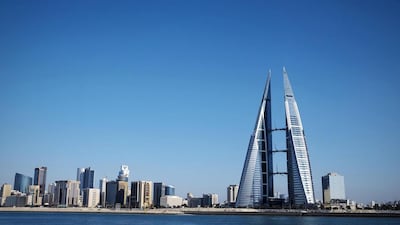Bahrain rolled out an economic plan that seeks to invest nearly $30 billion in strategic projects to fuel post-coronavirus growth, boost employment for citizens and attract foreign investment.
As per the multi-year plan, the government adopted cost rationalisation measures, including increasing VAT to 10 per cent, the official Bahrain News Agency said on Sunday. The move is expected to help the island kingdom balance its budget by 2024.
It aims to create more than 20,000 jobs for citizens annually until 2024 and train 10,000 more through its Tamkeen programme. The government also unveiled details of an initiative that seeks to attract $2.5bn in foreign direct investment by 2023.
“The swift healthcare and economic action taken by the government throughout Covid-19 secured the foundations of recovery, as evidenced by the real year-on-year growth of 5.7 per cent in the second quarter of this year," said Sheikh Salman bin Khalifa Al Khalifa, Bahrain’s Minister of Finance and National Economy.
"The kingdom is emerging from the pandemic with reasons to be highly optimistic, and the plan announced today aims to turbocharge the recovery.
“The plan is also a concrete statement of our intent to secure a balanced budget by 2024 and provide long-term fiscal sustainability, with eight new spending and revenue initiatives complementing our broader economic competitiveness enhancements.”
Bahrain's economy is estimated to have shrunk by 5.4 per cent last year, driven by a sharp contraction in non-oil output, according to the International Monetary Fund.
The country, the smallest within the six-member GCC economic bloc, is expected to expand its economy by 3.3 per cent this year owing to its quick policy response to minimise the effects of the pandemic, the IMF said this year.
The country’s non-oil economy will grow 3.9 per cent in 2021 as wider vaccine distribution encourages economic activity, the IMF said.
Under the latest plan, six new sector strategies will be implemented across oil and gas; tourism; logistics; financial services; telecommunications, IT and digital economy and the manufacturing sector. The move is expected to help the non-oil sector grow 5 per cent annually by 2022, the government said.
Bahrain is also taking steps to simplify the process of business licence approvals and will roll out an online portal to show off investment opportunities within the kingdom.
It will also launch a residency programme to attract talent but did not provide details of this.


